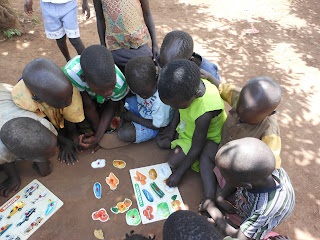Finally we (LABE) have been able to pull resources together and get out to the villages in the bush with all the wonderful puzzles and books you have so graciously sent. When we (PCVs) first arrived we were warned that it might take a year to get projects off the ground. “Naaah,” one says. “I’m organized, motivated – I can do better!” Well here it is one year in… Much ground work has been done, books cataloged, repaired where necessary, older programs finished, this round of audits mostly complete, new programs gearing up, etc. Things always happen in fits and starts: great momentum followed by whiplash stops. The morning after spending the last two days making learning materials in preparation to going to the field again, I was informed: “fuel is finished.” So, it was back to the office, working on other stuff – creating data-bases for the new program focused on establishing early childhood learning centers – always with other on-going programs and workloads in the background. As you read on, I want you to know how deeply appreciated your gifts of books, puzzles, supplies, toys and so many other things are. Truly, your generosity is making a difference for these children and their parents who are learning with them. Because of you, they will have opportunities and exposure to concepts and materials many other children will never see. There are not enough ways to say thank you.
A friend of mine recently commented on my earlier mention of the difference in cognitive abilities between the children here and those in the US – wondering aloud if there might be abilities of a different kind here – that have simply never been discovered or tapped and what makes the west think it has all the answers. In thinking about this, there is NO doubt that folks living close to the land, using every instinct for survival, growing food, occupied with providing for the daily needs of large families are much more in tune with rhythms and wisdom(s) that are simply ignored/lost in more “developed” environments. Every culture has its ancient wisdom that “progress” arrogantly pushes aside. There are forms of intelligence even in our own culture that will never appear on an IQ test. I’ve said before, with every step forward in modern convenience there is a trade. In these days of paradigm shift, I think we are more conscious that ever about those trades. If you’ve ever read the book Mutant Message from Down Under, written as fact, but alternately believed to be fiction because the tribal practices are so foreign to westerners, all manner of questions come up. But one doesn’t have to venture far into the realm of Quantum Physics and neuroscience to make connections between science, spirituality and ancient wisdom.
So – no I don’t mean to imply that the west has it figured out. We’re all in a world of woe if that’s all there is. But – if the goal is to learn to read and write and develop the kinds of cognitive skills that offer a different type of problem solving demanded by urban cultures toward which previously agrarian societies are gradually being pushed, then the west has some experience with that. So, enter things like puzzles and books and games and movements that build those skills. The educational system here is almost totally lacking in that realm so it’s wonderful to be able to introduce those things at a grass roots level, in the villages with children and adults who may never have the opportunity to attend a private school which might offer some of these things. Even in the private sector, however, these teaching tools are largely absent.
Friday we loaded puzzles, books, markers, and myriad other supplies in The Daughter of Japan (our faithful Toyota truck) and headed to Home Learning Centers in the bush. Dropping off supplies and a home made blackboard here and there, picking up some teachers and Parent Educators, we arrived at Palenga Pre-School and were greeted with 35 or so preschoolers dressed in lilac uniforms. Visitors are always welcomed with a song and this day was no different. Later the drums came out and we got music and dance as well. Since Muzungus are novelty and I had nothin’ in my bag of tricks but bubbles. And it turns out, nothing could have been better – wild excitement, shrieking, jumping and bubble chasing ensued.
After this great introduction, we wended our way through back roads and trails, the truck engulfed in towering grasses as we caught glimpses of tukuls (mud huts) tucked into neatly swept compounds and papaya groves approachable only by foot path. Finally we arrived at Adak Home Learning Center and were ushered past a man hacking his way through an 8-foot tall termite mound, the dirt from which will be made to build bricks that will – in turn – be used to construct more huts and possibly a bigger learning center. From the look of the underside of the thatched roof, this HLC seems fairly new and in this small dark space sit 30 or so children raging from about 3 – 6 years old. After a few minutes and some introduction from Joy in Acholi, the kids were divided into small groups and given the puzzles to explore. Because village children have never had the opportunity to work with puzzles we used very basic wooden puzzles we would give toddlers. Some “got it” immediately, others were still struggling to match apples to apples, etc. and understand that if it didn’t fit one way, you rotate it until it does. One understands in a heartbeat, that what seems intuitive is really a learned skill that in “first world” cultures one learns so gradually through “play” that you don’t realize how much is really taught. The older group was really challenged by a 12 piece puzzle, but totally engaged. 
After we’d burned off a little energy, books handed out into small groups. Again, these children have never held a book, so needed instruction on turning the book so the pictures were right side up. They were stunningly well behaved – ooooing and aahing over the pictures until everyone had had a turn with every book.
The next week we headed back to one of the villages we didn’t have time for last week. A large group had gathered under the Mango tree because unlike the previous folks, this village of Oduku has just cleared the land and is building a thatched shelter so classes can be held even in the rain.
One of the things that really moved me about this center was almost sacred nature of the tukul where the learning materials are and will be kept. Constructed of mud and thatch with a dirt floor, it was meticulous clean and with learning materials hung along the walls lined with lace curtains. They took greater care with this center than their own homes. You can see what they treasure and the reverence with which the greet the opportunity to learn.

Puzzles, home made Snakes and Ladders games, matching boards and books were all brought out to great excitement. The women “fighting” over puzzle pieces was the most fun. The kids had a hard time focusing on the puzzles until I got out of the picture. The teacher explained “all they see is your color…not the puzzle.” I tried without success to load the video, so these pictures will have to do.
The project is just getting off the ground and we have lots of centers to visit. After everyone gets an introduction to the puzzles and books, they will be divided up among the Early Childhood Centers and left for folks to use on a daily basis. Know that you generosity, time-energy-and funds for collecting and mailing these materials is truly appreciated and will be well cared for. You are all part of this project! Next: Pillow Case Dresses!
